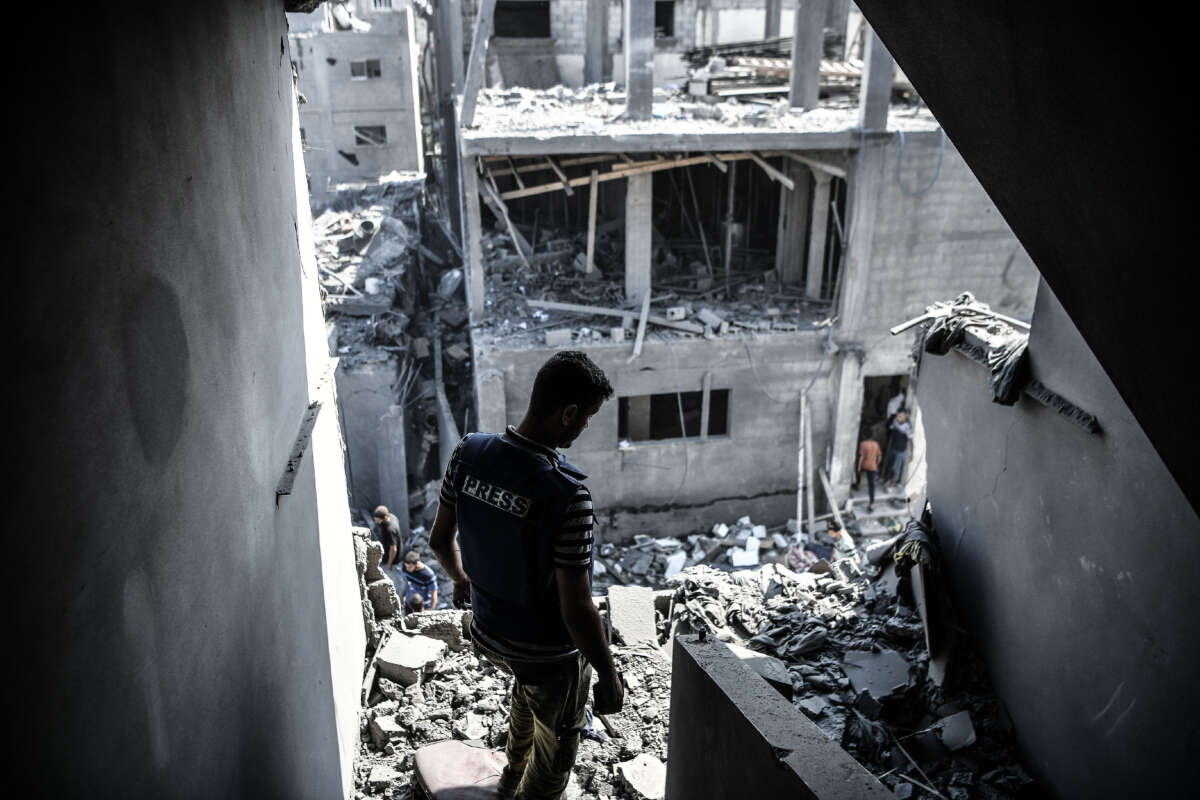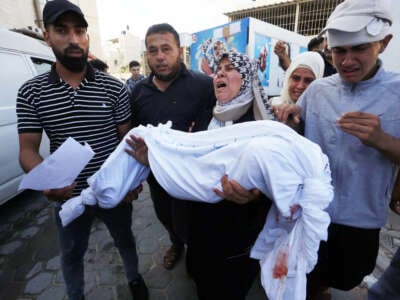This Could Be My Last Report From Gaza. Keep My Stories Alive.
“Today I’m telling you the news. Tomorrow, I may be the news,” writes Tareq S. Hajjaj.

Every time I go into the field for work, I’m keenly aware that it feels like I’m taking a direct route to my own grave. I slip from corner to corner, walking with so much care that it’s as if I must be a deadly threat to someone. I’m not a fighter. I have never held a gun or engaged in a fight. I don’t believe I’m a threat to Israel or anyone else — I’m just a writer who tells people’s stories. But I’m wrong.
For an occupying power, I might pose more of a danger to Israel than a fighter.
The fighters may die, and their journey will end, but as a writer, my stories can last forever. They are meant to chronicle the history of my people. The power of the occupation stems from its ability to hide history. Our role is to defend and maintain it, to preserve the truth about our people who were systematically slaughtered by their occupiers, whose nation was erased because our colonizer wanted to take our land.
In the first couple of days of the attack, I went into the field to report. The places I went to were always the safest ones I could go to in Gaza, like al-Shifa’ Hospital in Gaza City. I never thought that the hospitals would be targets of Israel’s warcrafts. But here we are, and Israel has proven that nothing will hold back its crimes in Gaza.
RELATED STORY

“I Lived All My Life as Collateral Damage,” Says Palestinian Activist
Activist Majed Abusalama calls for strikes and mass action across the globe to stop Israel’s genocide of Palestinians.
By Kelly Hayes , TRUTHOUT October 15, 2023
I went to a small cafe next to the hospital, where a group of journalists were stationed because it still had power and internet access. Every second that passed felt like we were living on borrowed time. We knew that Israel wanted to cut Gaza off from the world and would kill those who wanted to show the world their people’s suffering and reveal Israel’s crimes.
We work under the fear of death. We know we are Israel’s targets. But we fulfill our duty.
I wear my vest with the word “PRESS” emblazoned on it like a shield, and I cover my head with a blue helmet, thinking this will protect me, that I will be recognized as a journalist and spared Israel’s missiles. But it won’t protect me. My colleagues are slain every day. The Israeli airstrikes killed ten of them in the past week, and dozens have been critically wounded.
Every time I receive the news, it hits me hard, like it’s the first time. Every time I move, I feel like I’m taking my last step. I keep praying, asking God for protection — not only for my own sake but for my 9-month-old son’s so that he won’t grow up without a father. I will accept my own suffering, but I can’t bear to see him suffer.
When I prepare myself to leave my home and put on my PRESS vest, to my family, it looks like I’m a moving target. My family tries to prevent me from leaving. My wife brings my son to me. I know what she’s doing; she wants me to rethink my decision and stay home with them. But I say goodbye and leave before breaking down and crying in front of them. They need me to be strong.
For all of us, this is not the normal farewell we share with each other before I leave. It may be the last goodbye and the last time I hug them.
But this isn’t the only challenge I have to face throughout my work as a journalist in Gaza these days. Death follows me like a shadow, and the difficulty is in keeping myself together in front of all the heartbreaking scenes I see every day and keeping my eyes dry as I listen to the stories of the survivors.
But even those who weren’t killed didn’t truly survive. How on earth could they, when their entire family was killed or remains stuck under the rubble?
In Gaza right now, no one can guarantee their safety by staying home, while those who go to the field to carry out their duties hold their life in their own hands and move forward. And for people like me, it doesn’t matter anymore if we are killed. We are chosen to be messengers for our people’s suffering.
But what motivates me is knowing that my voice is heard and the massive support from my team. Even when I can’t write and can only speak over the phone, my colleagues in Mondoweiss turn my thoughts into stories. They are the reason that my voice is heard.
Today I’m telling you the news. Tomorrow, I may be the news. I’m not sure that I will be able to write another story in the upcoming days. I’m not sure that I will survive. Israel decided, along with the U.S. and European countries, to wipe out the entire Gaza Strip. They plan on turning us into refugees one more time, and now they’re putting pressure on Egypt to host us. But the majority of people in Gaza have decided to stay in their homes, even if it meant being exterminated.
My message to everyone who reads these lines is to remember that the most powerful countries in the world are killing civilians in Gaza. Do not believe them when they speak about human rights and humanity. They have no humanity. We begged them over the past 17 years to break our siege. They never listened. Yet they are rushing to kill us.
Keep my stories alive so that you keep me alive. Remember that I wanted a normal life, a small home full of my children’s laughter and the smell of my wife’s cooking. Remember that the world that pretended to be the savior of humanity participated in killing such a small dream.
Remember me, as I prepare myself to leave this world by force and go to a better one — one where the U.S. and Israel do not exist.
Tareq S. Hajjaj,
October 15, 2023
No comments:
Post a Comment